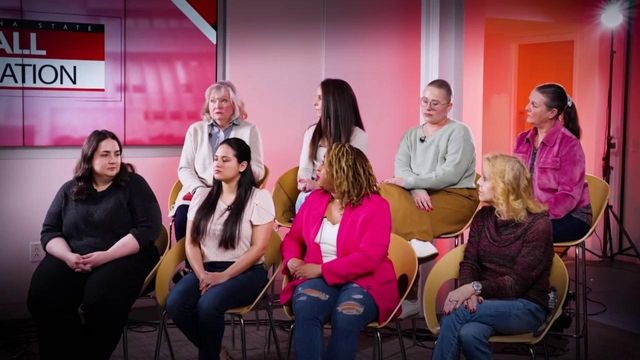Hear from 8 women diagnosed with cancer who spent time at NC State's Poe Hall
Thursday marks three months since North Carolina State State closed Poe Hall after it tested high for PCBs.
In that three-month span, 5 On Your Side has received 123 reports of cancer in people who worked or studied in Poe Hall.
It’s not known if the PCBs found in Poe Hall have anything to do with the cancers and many other health problems that have been reported to 5 On Your Side. However, many people who’ve come forward to WRAL News say they want more answers and acknowledgment from the university.
In a WRAL 5 On Your Side exclusive, eight women who worked or studied at Poe Hall and were later diagnosed with cancer spoke publicly for the first time. Each one says they agreed to the interview to give a voice to people who worked or learned in Poe Hall and are struggling with health issues. All are critical of the university’s handling of the closure, subsequent testing, and guidance.
Eight women who spent time in Poe Hall and were diagnosed with cancer speak publicly
Sandy Alford was diagnosed with breast cancer in 2021 after studying for years at Poe Hall.
“NC State has taught us that there is the strength of the Wolfpack, and that the pack takes care of each other," Alford said. "Here are the faces of some of the pack members who need to be talked to, need to be communicated with.”
Alford told WRAL 5 On Your Side that learning about all the cancer cases in people who spent time at Poe Hall felt nearly as difficult as when she first found out she had cancer.
“Any cancer patient will tell you about the phone call that came when they learned they had cancer. It feels like another phone call,” Alford said of the high case count.
“We know people get cancer in large numbers. We are not talking about NC State as a whole; we are talking about just one building,” said Tremaine Brittian, a former NC State student and employee.
Brittian spent 10 years at Poe Hall. She told 5 On Your Side that she knew at least three others from Poe Hall with cancer. In 2020, she said she relayed her concern of a possible cancer pattern.
“I brought it up to leadership and just said, ‘Hey, with these recent cases, something just seems weird,’" Brittian said.
PCB testing and reports of cancer
It would take three more years, 13 cases of cancer, and an employee filing a complaint with the State Department of Labor before NC State tested Poe Hall, the university’s education and psychology hall, for PCBs.
The toxic chemicals were used in building construction in the middle of the 20th century, but were later banned because of their link to cancer and a myriad of other health conditions.
“It’s a probable carcinogen in humans,” said Madison Hudson, another student who spent time in Poe Hall and was diagnosed with lymphoma.
The initial testing done in Poe Hall found levels 38 times higher than what the United States Environmental Protection Agency deems unsafe. More testing is currently being conducted by the consulting firm Geosyntec Consultants.
“I wasn’t shocked at all; I was just more shocked that it came to light,” Brittian said of the testing that revealed high levels of likely carcinogens.
For Ana Mora, a former student who was diagnosed with lymphoma at 28, something clicked.
“When I was diagnosed, the doctor couldn’t tell me why I was diagnosed or why I had cancer. I would like to know if maybe it was a cause,” Mora said of the PCBs found in Poe Hall
Many people have the same question as Mora and went to the university to get more information. But when Brittian reported her breast cancer diagnoses to a university employee, she never received a response.
“Not even thank you for letting us know, we’re sorry, we hope you’re well,” Brittian said.
“If they found these chemicals in the building and shut it down, and all of these people are sick, that’s serious,” said Michelle Kranig, a former psychology student who was later diagnosed with breast cancer.
WRAL 5 On Your Side has produced nearly two dozen stories on Poe Hall since it closed in November, interviewed more than a dozen people on camera and hundreds more off, and filed 12 public records requests.
Earlier this month, 5 on Your Side reported NC State was no longer participating in an independent investigation into the health issues at Poe Hall, a decision they reversed after our report. With each story more people diagnosed with cancer came to WRAL.
WRAL 5 On Your Side received information, including the type of cancer, time spent in Poe Hall, ages of diagnosis, and year of diagnosis from nearly every person who reported a case, and teamed up with WRAL Data Trackers to take a deeper look at the numbers.
A closer look at the 123 Cases of cancer reported to 5 On Your Side and Data Trackers
Four out of every 10 cases were breast cancer, according to the data. Lymphoma, skin cancer and leukemia were also highly prevalent diagnoses. A handful of people were diagnosed with more than one type of cancer, and several others received a cancer diagnosis on multiple occasions.
“I had already been in Poe for about three years when they started coming. First, thyroid cancer my junior year and a soft tissue cancer my senior year,” said Christie Lewis, a former NC State student.
The majority of those diagnosed are women – 77% . And about two-thirds are former grad students or former faculty or staff, 16 people currently work at NC State or are going to school there.
The youngest person was 19 at the time of diagnosis; the oldest was 78 when they were diagnosed – the average age is 44 – that’s about 20 years younger than when the average American is diagnosed with cancer.
These span decades – someone who shared their story with us was just diagnosed last month, after the building closed and they were there for years. The earliest diagnosis was in the 80s.
Are the reported rates of cancer in Poe Hall higher than normal?
Without complete data, it’s hard to know.
However, in 2022, the likelihood of a woman in Wake County being diagnosed with breast cancer was one in 650, according to the National Cancer Institute. Yet in the same year, five women who had worked in Poe Hall were diagnosed with breast cancer—a rate at least three times higher than what we’d expect.
What is being done about Poe Hall and the reports of illness and cancer?
WRAL 5 On Your Side asked NC State leaders if the university had a comment about people who spent time in Poe Hall and are reporting cancer and other illnesses.
"The illnesses being reported are devastating, and we remain committed to getting answers about the building with the health of our community in mind," a university spokesperson wrote in an email. "We began investigating the building in response to employee concerns, and we’re committed to getting answers, but this process takes time.
"Gaining a greater understanding of what issues may exist in the building is critical to understanding and informing any potential impacts on health."
WRAL 5 On Your Side also asked the university about what it is doing to address employees' concerns who never heard back.
"Everything we’ve done and everything we’re continuing to do is to help address the concerns expressed by our community with evidence-based information," the university spokesperson wrote. "At NC State’s request, NIOSH has opened a new Health Hazard Evaluation.
"We are waiting for information on how NIOSH wants to proceed. The lines of communication remain open."
Also, WRAL News asked NC State leaders about employees and staff's concerns that university messaging is not addressing cancer cases or other illnessnesses.
"As an institution, we are doing all that we can to get answers, but this will take time," the spokesperson wrote. "As the Chancellor shared in his message to the community last week, we remain committed to transparency and - most importantly - to doing the right things to ensure NC State is a safe place to work, learn and live.
"We absolutely hear peoples’ concerns, and we’ll do all that we can to earn and keep the trust of our community throughout this process."
Mid-February, NC State announced it was re-requesting a health hazard evaluation from the National Institute of Occupational Safety and Health.
In a statement, Chancellor Randy Woodson told the NC State community the decision to reopen the request on Feb. 12 was because the university had additional testing results from Geosyntec. That testing was conducted at the end of December.
Woodson told the NC State community that additional testing will take place in March. Geosyntec’s first round of testing showed lower levels of PCBs than the preliminary testing done in the fall. Geosyntec’s testing took place with the HVAC system turned off. This was concerning to ovarian cancer survivor Lee Stephens Hernan.
“Do the testing with the HVAC on, so we know what it was like when we were in the building,” she said.
The university said Geosyntec will conduct further testing in March. During this testing, the HVAC system could be turned back on.
The university created a Poe Hall updates page, complete with messages from Chancellor Randy Woodson. It does not mention cancer, or the many other serious illnesses connected to PCBs.
An NC State spokesperson told WRAL 5 On Your Side that the university is unable to comment on specific health issues until more testing is done to understand the severity of the PCBs found inside.
The cost of cancer and anxiety of Poe Hall
“Unless you’ve been through it, you can’t even imagine what it is like; it’s horrific,” Stephens Hernan said.
Catie Roland, a former NC State student who spent years in Poe Hall and was later diagnosed with breast cancer, called the university’s handling of health concerns unforgivable.
Roland tells WRAL 5 On Your Side that many of the people she went to class with at Poe Hall and who are healthy are fearful they will later become sick.
“I feel strongly that the university needs pressure to handle this situation swiftly and with a lot of care for the people involved,” Roland said.














